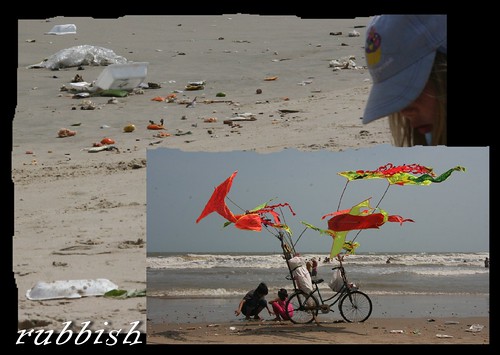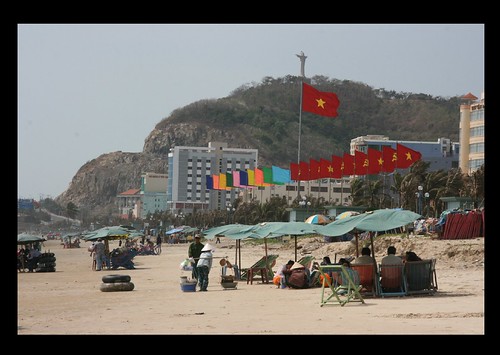another day at the beach
Vung Tau, Vietnam
To my two eldest children,
I love it when I make a comment in passing and you rise to the challenge presented. Even better when I’m allowed to copy out your journal entries for the blog!
The comment:
I wonder what the issues are regarding the pollution we’ve witnessed here.

Jboy13 wrote:
We spent all day at the beach, which is covered with plastic bags, lolly wrappers and old material. Wherever you sit, there is not 10 metres away without rubbish. In the water it’s the same; bags float under the water, dead jellyfish float on the surface (even if there were only three), and the water itself is murky. High tide washes up black sticky globs of crude oil (not that we noticed until we walked through them – and they do not wash off easily – or at all, for that matter).
That’s the problem out here at the coast, but in the city (Saigon), the city with the most motorbikes in the world, there is always (well, in the few days we were there!!!) a thick hazy smog. The big question is how to help/find a way to reduce the pollution.

One way to reduce the rubbish on the beach would be to provide rubbish bins all the way along it. Then you put up signs and get people to be more tidy. They have tables, chairs and umbrellas along the beach, but no bins. Those tables could have bins with them so that people wouldn’t just biff their rubbish on the beach.
(I don’t really know, but I think after going to the rubbish dump in Phnom Penh, I’m not sure if it’s good to send stuff to the dump, but it’s better than making the beach a dump. And if you have a dump in the city, then why not use it? Of course, that doesn’t mean you make as much rubbish as you can coz you can, but, like we did at home, you can use reusable bags when you go out shopping).
You can’t do much about the oil, but perhaps the oil rigs could set up some kind of net thing that floats on the surface to stop the oil form floating in to the beaches. I think that’s a way to help it, but in the city I’m not sure how to reduce the air pollution. You could have a public transport system that is cheap and reliable so people would use it and not have so many motorbikes. But I don’t have the money and I’m not the mayor. But you could write/email him and give him some ideas.
Well, that’s a few things to think about.
Ah yes, my dear, a few things to think about for sure. And now I have few things for YOU to think about (you knew I would, didn’t you?!)
* how do you think you can “get people to be more tidy”? Is it possible?
* what do you think is bad/wrong about rubbish dumps per se?
* what alternatives do you think there are to dumping rubbish in landfill?
* the oil on the beach is unpleasant – do you know how it affects the living things in the water? what does it do to the waterways?
* how much do motorbikes pollute the atmosphere in comparison with cars? how much do we need to consider this in clean green new zealand? what role do we play in keeping our country clean?
* when will you be mayor? <wink>

Jgirl14 observed:
People here do not live for the future, they live in the now. So if you leave a bag of rubbish on the ground, well it’s only one bag, rather than thinking that if everyone does this it will make the problem worse. It seems to be part of the culture to “litter the country” – where there are people, there is rubbish.
She then went on to itemise some thoughts about pollution:
- * Firstly, pollution isn’t a good thing; not for anyone or anything.
- * It is ruining large countries as well as small, poor and rich.
- * Even though we can personally help minimise the problem, unless heaps of people try to keep their bit clean, then it’s a losing battle.
- * The main forms of pollution we have encountered are exhaust fumes and rubbish dropping. Perhaps exhaust fumes are inevitable in a large country, but they might not be so bad if people were prepared to walk a km or take a bike or cyclo. I guess you can’t say people here don’t use public transport – in fact, they cram twice the amount of people as there are seats!
- * Pretty soon someone is going to realise what pollution does and how it affects your health and they might try to do something about it.
- * I don’t think pollution CAN’T be changed, but if something isn’t done soon, it is going to be hard to reverse.
OK, my other dear, my turn to question you!
How many people do you think will need to do something to create positive change?
Is it worth you do your bit if the majority are doing nothing?
Do you think the people living in (for example) Saigon, are unaware of the health issues? Why do you think they wear face masks? What would you do if you were born there and could not go and live in New Zealand at the end of the year? What choice do they have?What are the main causes for the Saigon smog other than motorbikes?
How could you inform people of the hazards of pollution? Who do you think needs informing?
Do you know of any anti-pollution lobby groups? (or more positively, “clean green” ones) What do they do? How do they bring about change?
Finally for now, how do you think our lives would change without oil? Let’s keep discussing this….it has been encouraging to see you and some of your younger siblings engage with these ideas….to see the lightbulbs coming on (“Oh, so THAT’S why you try to buy products with no packaging”)….to consider different scenarios…..to look for answers….to evaluate our own stewardship practices….Lots of love,
Mama xx
Tags: children, health, justice, learning, parenting, postcard: Vietnam, recreation




H’mmmm. “day at the beach ‘ sounds great until you read on…….
Anyway I hope you managed to find a few clean spots where you could all relax and have a splash.
Not quite the same as Whananaki though!
I liked the decorated garbage – collecting bike. A splash of colour in a rather dismal setting
[…] ways to change our behaviour. Or we could use the very poor example of other countries, like the Kiwi family of Pilgrims Progress did, as a learning experience for us and for our […]